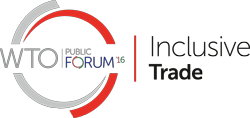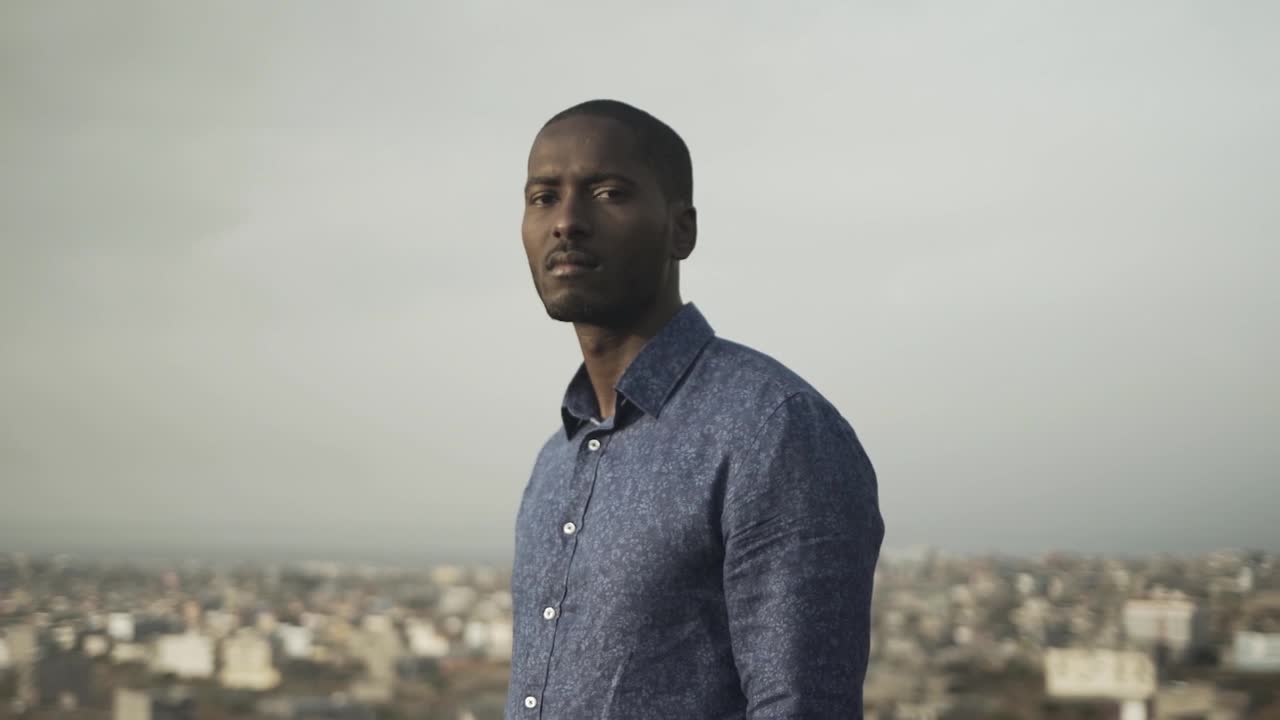27-29 September 2016
Geneva, WTO headquarters
Under the theme "Inclusive Trade", the Forum will be an opportunity to discuss how a wider range of individuals and businesses can participate in the trading system and how WTO rules can help to ensure everyone benefits from trade. At a time when the business environment is changing and world growth is slowing, it is important to ensure that trade is truly inclusive, allowing small enterprises, women and innovative businesses to take an active role in the global trading system.

REGISTRATION IS NOW CLOSED
> Download (right-click and select “Save as” to download and view offline) Quality: > help
Public Forum 2016 — “Inclusive Trade”
Trade is not just for big business. SMEs are playing a greater role in international trade. Many have grown into micro-multinationals. A 2013 study of 2,100 SMEs across 21 countries conducted by Oxford Economics and SAP reported that "the roster of SMEs generating more than 40% of revenue outside their home country will have increased by 66%" by 2016. A report published by eBay in 2013 revealed that over 95% of small businesses engaged on the eBay platform are exporters. Across the eight markets analysed, the average number of international markets reached by exporters is around 30 to 40. Some 60-80% of new businesses analysed “survive” their first year. The respective figure for traditional exporters is only around 30-50%. Innovation has been driving SMEs' expansion into the global market. This year's Forum will examine how the WTO can foster SMEs' participation into the global market. The flagship World Trade Report will be looking at this issue in depth and will be launched at the Forum.
Today's world is dominated by digital innovation. New technologies have transformed the way the world trades and have given a boost to trade growth. Trade, in turn, is a driver of innovation. The Forum will look at how the trading system can support innovation. Trade and new technologies are inextricably interlinked - one fostering the other. Can trade keep up with ever-changing technology? Does the WTO need to reform trade rules to allow members to fully benefit from innovation? How can we tackle internet governance issues? Is technological innovation a driver of development? Has trade helped countries to innovate? How can innovation enhance the trading capacities of developing countries? The Public Forum 2016 will provide an opportunity to share ideas on all these topics.
The Forum will also discuss how women can participate more fully in international trade and how they can overcome the constraints preventing them from reaping the benefits of trade.
Background
The annual Public Forum is the WTO’s flagship event. It provides a unique platform for heads of state and leading global businesspeople, academics and non-governmental organisations to come together and discuss some of the major trade and development issues of the day. Over 1,500 participants attend the Forum each year.
This year’s event is particularly special as we are marking the 15th anniversary of the Public Forum.
Programme
10:00 - 12:00
Opening Plenary Debate
Inclusive Trade
Room CR
Speakers:
Roberto Azevêdo, Director-General of the WTO: Audio ?Speech
Cecilia Malmström, EU Trade Commissioner: Audio
Hanne Melin, Director of Global Public Policy, eBay
Okechukwu E. Enelamah, Industry, Trade & Investment Minister of Nigeria: Audio ?Speech
Roy Ombatti, Founder of African Born 3D Printer
John Danilovich, Secretary General of the International Chamber of Commerce
Moderator: Liu Xin, Chief Correspondent of CCTV
12:00 - 13:00
MIDDAY SPOTLIGHT
SOAP-BOX DEBATE
Responsible business in global supply chains: whose responsibility is it?
Lessons learned from the garment sector
Organized by the Permanent Mission of the Netherlands to the WTO in
collaboration with the Permanent Mission of Bangladesh to the WTO
Atrium
Speakers:
Business?perspective: Representative of Bangladeshi Garment Manufacturing Employers?Association (TBC) Governments?perspective: Mr Christiaan Rebergen, Vice-Minister for Trade and Development, Ministry of Foreign Affairs of the Netherlands Civil Society抯 perspective: Erica van Doorn, Director Fair Wear Foundation Discussant: Arancha Gonz醠ez, Executive Director International Trade Center
Moderator: Filippo Veglio, Director Social Impact, World Business Council for Sustainable Development
The proliferation of internationally joined-up production arrangements - often referred to as global supply chains - is an important trait of international trade and is by its very nature inclusive: it involves and affects many stakeholders, from both the public as well as the private sector in business interactions, transactions between labour and capital and policies on a wide range of issues. Global supply chains hold tremendous potential for development and economic upgrading and can contribute to trade that is truly inclusive. However, not all countries or stakeholders benefit equally from participating in supply chains.
Against the background of the Global Goals for Sustainable Development and the call by DG WTO Azevedo to strengthen efforts to include the private sector in WTO discussions, this debate session will discuss how responsible business conduct in global supply chains can contribute to more inclusive trade and to sustainable development. It will focus on roles and responsibilities of different stakeholders to ensure that economic and social upgrading go hand in hand and discuss ramifications for the multilateral system.
This one-hour side event will focus on the garment industry, as it is a prime example of an industry where cross-border business transactions are manifold. It is an industry that through international trade has been a driver for development in many countries. At the same time, it is a good example of a sector in which most value-added is achieved in pre- and post-production phases, rather than in the actual production and assembling phases that are often outsourced to developing countries. It is a sector in which buyers and suppliers differ greatly in their bargaining power and influence, an asymmetry that warrants a discussion on the extent of responsibility of individual businesses. It is also a sector in which many initiatives are taken to support or strengthen responsible business conduct, both by buyers and suppliers and often supported by governments, civil society and international organizations.
This event will be hosted by the Permanent Representation of the Netherlands in close collaboration with the Permanent Representation of Bangladesh. During the event a multi-stakeholder panel, with speakers representing the private sector, government, civil society and the international community – key actors in global supply chains – will present their views on a number of questions. A moderator will facilitate the debate and actively involve the audience in the discussion.
14:30 - 16:00
PLENARY SESSION
WORLD TRADE REPORT 2016 LAUNCH
Inclusive Trade and SMEs
Room CR
Speakers:
Roberto Azevêdo, Director-General of the WTO: Audio — Speech
Rt Hon Liam Fox MP, Secretary of State for International Trade of the United Kingdom: Audio
Robert B. Koopman, Chief Economist of the WTO: Audio
Hildegunn Nordas, Senior Trade Policy Analyst at the OECD: Audio
Kati Suominen, Founder and CEO, Nextrade Group; Founder and Chairwoman, TradeUp Capital Fund: Audio
Manuel Aldrete, General Manager of Chicza Rainforest: Audio
Sherill Quintana, Owner and Founding President of Oryspa: Audio
Moderator: Keith Rockwell, Spokesperson of the WTO
World Trade Report 2016: Levelling the trading field for SMEs
Today抯 increasingly interconnected global economy is transforming what is traded and who is trading. International trade has long been dominated by large companies. But thanks to dramatically reduced trade barriers, improved transportation links, information technologies and the emergence of global value chains, many small and medium-sized enterprises ?SMEs ?now have the potential to become successful global traders as well. Participation in international trade, once exclusive, can progressively become more inclusive.
The World Trade Report 2016 examines the participation of SMEs in international trade. In particular, it looks at how the international trade landscape is changing for SMEs, where new opportunities are opening up and old challenges remain, and what the multilateral trading system does and can do to encourage more widespread and inclusive SME participation in global markets.
19:15 - 21:15
PUBLIC FORUM RECEPTION
CR Lobby
Reception
12:00 - 13:00
MIDDAY SPOTLIGHT
WTO Bookshop and Library present a book and its author
'What You Need to Know to Go Global'
Atrium
Stephen Creskoff, International Trade Consultant, (Author)
Sarah Thorn, Director, Global Government Affairs, Walmart (Discussant)
Steve is a lawyer and leading expert on international trade transactions, trade facilitation and the legal foundation for international trade. He has worked as a trade lawyer and senior trade consultant for international businesses, trade associations, the World Bank, the U.S. Government and other organizations in more than 50 countries. He is a graduate of the University of Pennsylvania and holds graduate degrees from the University of Maryland (J.D., with honors) and Georgetown University (LL.M, international law).
More information on the book here
Available for purchase at the WTO Bookshop at a special price and for consultation/lending at the WTO Library
14:30-15:30
BOOK LAUNCH
African Perspectives on Trade and the WTO:
Domestic Reforms,
Structural Transformation and Global Economic Integration
Room W
Speakers:
Roberto Azev阣o, Director-General of the WTO
Okechukwu Enelamah, Minister of Industry, Trade and Investment, Federal Republic of Nigeria
Joshua Setipa, Minister of Trade and Industry, Kingdom of Lesotho
Axel Addy, Minister of Commerce and Industry, Republic of Liberia
Patrick Low, Former Chief Economist, WTO
Moderator: Chiedu Osakwe, Ambassador, Trade Advisor to the Minister of Industry, Trade and Investment, and Chief Negotiator, Nigeria
Africa is one of the fastest growing regions in the world. According to the latest IMF World Economic Outlook in January 2016, Sub-Saharan Africa is set to grow a 4.0% in 2016, following a lower growth rate of 3.5% that reflected the declines in commodity prices. These positive figures are the reflection of Africa's deeper integration into the global economy through economic policy, legal, institutional and structural reforms. Furthermore, Africa's deeper inclusion in trade was evidenced by the 10th WTO ministerial conference held in Nairobi in December 2015. This provided a platform for trade policy decision-makers to reflect and offer their perspectives on the core parameters for the deeper engagement of the continent in the Multilateral Trading System. MC10 successfully delivered favourable outcomes towards some key issues, pertinent to the continent. Although there is progress, several challenges remain and there are risks and vulnerabilities. In addition to domestic governance challenges, global uncertainties such as market turbulences, economic slowdown, reduced demands from China re-balancing its domestic economy, the crash of commodity markets, and terrorism, have affected the growth of the continent. Africa's lead economic and trade policy makers, like counterparts in other regions, are reassessing growth models and strategies, reflecting the range of challenges facing their economies and different comparative advantages. The book "African Perspectives on Trade and the WTO: Domestic Reforms, Structural Transformation and Global Economic Integration", addresses the following principal questions: How will Africa achieve deeper and more development-meaningful integration into the rules-based Multilateral Trading System and a 21st century Global Economy in dynamic transition? What are the perspectives, approaches and "immediate next steps", as seen by the lead economic and trade policy managers on the continent? What supportive roles can be played by the key multilateral economic and regional institutions?
12:00 - 13:00
MIDDAY SPOTLIGHT
WTO Bookshop and Library present a book and its author
The Regulation of International Trade (Volumes 1 & 2)
Atrium
Author: Petros Mavroidis, Professor of Law at Columbia Law School
Discussant: Robert Wolfe, Professor at Queen's University School of Policy Studies, Kingston
More information on the book here and here.
Available for purchase at the WTO Bookshop at a special price and for consultation/lending at the WTO Library
14:30-15:30
BOOK LAUNCH
Regional Trade Agreements and the Multilateral Trading System
Room W
Speakers:
Roberto Azev阣o, WTO Director-General
Rohini Acharya, Editor and Chief of Section, Regional Trade Agreements, in the Trade Policies Review Division
Daniel Blockert, Permanent Representative of the Swedish Mission to the World Trade Organization and Chair of the Committee on Regional Trade Agreements
Bernard Hoekman, Professor and Director, Global Economics at the Robert Schuman Centre for Advanced Studies, European University Institute
Moderator: Rohini Acharya, Editor
Regional Trade Agreements and the Multilateral Trading System
The book explores bilateral and regional trade agreements and examines how they are changing international trade rules. It offers an important contribution to the current debate on the role of the WTO in regulating international trade and how WTO rules relate to new rules being developed by RTAs. The work is based on what is probably the largest data set used to date. It provides a deep analysis of RTA provisions, identifying which provisions tend to be more liberalizing than others, whether there are any trends that can be identified and whether RTA provisions are moving ahead of the WTO framework, thereby creating a dual system of standards for international trade. This volume makes an important contribution to the current debate on the role of the WTO in regulating international trade and how WTO rules relate to new rules being developed by RTAs.
-
14.30 ?14.40: Opening remarks and launch of the book
Roberto Azev阣o, WTO Director-General
14.40 ?14.50: Presentation of the book
Rohini Acharya, Editor and Chief of Section, Regional Trade Agreements, in the Trade Policies Review Division
14.50 ?15.15: Panel discussion
Daniel Blockert, Permanent Representative of the Swedish Mission to the World Trade Organization and Chair of the Committee on Regional Trade Agreements
Bernard Hoekman, Professor and Director, Global Economics at the Robert Schuman Centre for Advanced Studies, European University Institute
15.15 ?15.30: Questions and answers
15.30 ?16.00: Invitation to refreshments
The book will be offered at a special 25% discount following the event.
A Cambridge University Press and World Trade Organization co-publication.
Launch event sponsored by Cambridge University Press.

